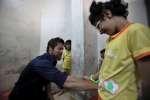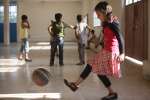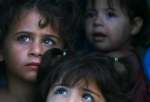- Text size
 |
|  |
|  |
| 
- Français
UNHCR highlights dangers facing Syrians in transit, urges countries to keep borders open
News Stories, 18 October 2013
GENEVA, October 18 (UNHCR) – With growing numbers of Syrians seeking safety in Europe, the UN refugee agency said on Friday it is concerned about severe difficulties these displaced people face during their passage and at borders. This includes the risk of drowning at sea and incidents where Syrians have been dangerously hindered in their journeys.
UNHCR chief spokesperson, Melissa Fleming, cited the case of a boat carrying between 400 and 500 Syrians and Palestinians that sank in the Mediterranean last Friday. Only 200 people have been rescued. "We are disturbed that the cause of the tragedy could well be attributed to shots that were fired after the boat left Libya, injuring four passengers and damaging the hull," Fleming said in Geneva.
The same day, she noted, a boat sank just off Alexandria in Egypt with an estimated 112 passengers on board, 40 of whom were Syrian. Twelve bodies were recovered, including five children. The survivors are being held in detention facilities in two police stations.
They were among a growing numbers of Syrians trying to cross the Mediterranean from Egypt to Italy because of anxiety about their security. Many mention physical assaults, verbal threats, detention and deportation. The Egyptian government estimates that some 250,000 to 300,000 Syrians currently reside in Egypt, of whom more than 122,000 are registered with UNHCR.
Between January and the end of September, at least 7,557 Syrians and Palestinians arrived on the coast of Italy, including 6,233 since August in 63 boats. This compares to about 350 Syrians in 2012. Most of the Syrian refugees that reach Italy continue on to other countries in Europe in search of asylum.
Fleming said that the increasing number of unaccompanied children making the voyage was also a major concern for UNHCR. As the cost of travel can range from U$2,000-US$5,000 per person, some families opt to send their children alone or with relatives or friends.
"UNHCR notes with concern that over 800 Syrians have been arrested in Egypt since August for attempting to illegally depart and 144, including 44 children, have been deported to third countries," Fleming told journalists. "Although charges have not been laid, approximately 589 Syrians remain in administrative detention, including women and 84 children. UNHCR is seeking access to the detained in order to properly verify numbers, conditions, and needs, or provide legal assistance," she added.
UNHCR recognizes that a number of countries in North Africa are increasingly affected by the displacement caused by the Syria crisis, placing additional demands on their infrastructure and resources. Given the dramatic needs of Syrian refugees, which are likely to continue and grow in the immediate future, reinforcement of capacity to receive them in North African countries is increasingly urgent.
The refugee agency is working with governments, the European Union and other partners to put in place a comprehensive response to saving lives of refugees and migrants at sea. UNHCR is calling for a number of measures to prevent further tragedies and increase responsibility sharing.
"UNHCR calls upon states beyond Syria's immediate region to explore concrete and meaningful ways of expressing solidarity, notably with a view to sharing the immense burden and protection responsibilities currently being assumed by the countries neighbouring Syria and its vicinity, such as Egypt. Warning signs in some hosting countries testify to the potentially destabilizing impact of the Syrian refugee influx that aggravates the already severe political, security, and economic repercussions of the Syria conflict," Fleming said.
Apart from much-needed solidarity through financial and other contributions to affected countries in the region for addressing the humanitarian and emergency development needs, solidarity could take the form of humanitarian admission, resettlement, simplified and expedited family reunion, facilitated visa procedures and the extension of student or employment-related visas. UNHCR welcomes a number of offers in this regard, but urges other states to join this effort.
UNHCR further calls on countries beyond the region to ensure appropriate treatment and protection for Syrians by ensuring access to territory and to swift and fair asylum procedures. Generous approaches to protection are needed, including non-penalization of those arriving without identity documents (or otherwise in an irregular manner) and high refugee recognition rates coupled with the granting of associated rights.
States could also offer flexibility in the application of family reunification criteria and procedures, as would be the dispensing with certain visa requirements and facilitation of the entry of Syrians for work, study, family or humanitarian purposes under national programmes.









































